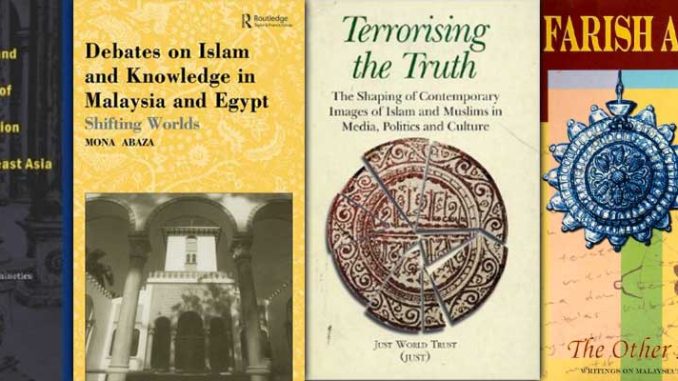
Georg Stauth
Politics and Cultures of Islamization in Southeast Asia: Indonesia and Malaysia in the Nineteen-nineties
Bielefeld / Transcript Verlag / 2002
Mona Abaza
Debates on Islam and Knowledge in Malaysia and Egypt: Shifting Worlds
London / Routledge Curzon / 2002
Syed Hussein Alatas
Ke Mana dengan Islam
Kuala Lumpur / Utusan Publications & Distributors / 2002
Farish A. Noor
Terrorising the Truth: The Shaping of Contemporary Images of Islam and Muslims in Media, Politics and Culture
Kuala Lumpur / JUST / 1995
Farish A. Noor
“The Localisation of Islamist Discourse in the Tafsir of Tuan Guru Nik Aziz Nik Mat, Murshid’ul Am of PAS”
In Malaysia: Islam, Society and Politics, ed. Virginia Hooker and Norani Othman
Singapore / ISEAS / 2003
Farish A. Noor
The Other Malaysia: Writings on Malaysia’s Subaltern History
Kuala Lumpur / Silverfishbooks / 2002
Chandra Muzaffar
Muslims, Dialogue, Terror
Kuala Lumpur / JUST / 2003
Stauth analyzes the manipulation of Islamization from above, the employment of intellectuals, and the reconstruction of local Islamic traditions in the new think tanks engineered by former prime minister Mahathir Mohamad. These prestigious institutions symbolize UMNO’s Islamic commitment and are essential to the state project of modernization and bumiputra emancipation. One very prominent intellectual in this project is Syed Naguib al-Attas, student of eminent western Orientalists and teacher and friend of Anwar Ibrahim. Al-Attas’ goal is to de-westernize indigenous knowledge and Malaysian politics.
Mona Abaza places the Islamization of knowledge project in the context of the post-colonial debate, western domination and military hegemony, and the Muslim psyche of crisis and dependency. Both works are concerned with the positioning of Muslim intellectuals in an unfolding discourse intimately tied to the West and the western critique of culture. Through fascinating insights into Muslim intellectuals, visions of the re-organization of Muslim society against the West and against the secular become clear.
Three Malaysian scholars have contributed to a sustained critique of the political instrumentalization of Islam – Syed Hussein Alatas, Farish A. Noor, and Chandra Muzaffar. Syed Hussein Alatas (S.N. al-Attas’ older brother) analyzed western biases in studying Asian societies before Edward Said’s Orientalism. In his new book, Alatas argues that Islam has been taken hostage for political purposes. Alatas was the mentor of Muzaffar, who developed his own perspective on Islamic civilization, ethics, and concepts of justice. Both are skeptical about the Islamization of knowledge project, believing that the Islamizers would suppress any form of political freedom.
Noor argues that S.N. al-Attas frames Islam in terms of a culturally specific, nostalgic past threatened by western secularization. For the agents of the Islamization project, Islam possesses a mission of salvation and is the sole religion with universalistic claims. As Noor notes, these ideas had enormous appeal for a generation of Malaysian students returning from studies abroad disillusioned with the West and uncomfortable in their own history.
Alexander Horstmann
Alexander Horstmann is Research Fellow in the Study Group 2003-2005: “Islam and Civilisation in Modern Society: The Positioning of Islam in the Perspective of Comparative Interaction,” directed by Georg Stauth, at the Institute of Advanced Studies in the Humanities (KWI), Essen.
He had the honor of discussing questions of political Islam with S. H. Alatas, Farish A. Noor, and Chandra Muzaffar in the summer of 2003.
Read the full unabridged article HERE
Kyoto Review of Southeast Asia. Issue 5 (March 2004). Islam in Southeast Asia
